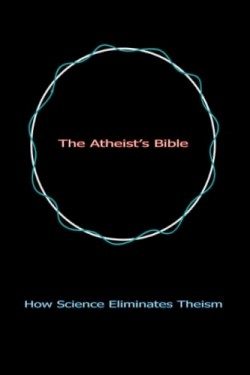The Atheist's Bible
How Science Eliminates Theism
“Attention: if one feels that one is not ready to have all of one’s theistic beliefs fully challenged and have his/her entire perception of reality overturned one must put this book down now and never pick it up again” the author warns readers at the beginning of The Atheist’s Bible.
Geoff Linsley’s book is broken down into four sections. The first “The Book of Existence” is very heavy reading that throws virtually every science concept learned in school and college at readers in order to set up the base of knowledge needed for understanding the later chapters. While it is interesting and informative it tends to read like a textbook at times. The other three books—“The Book of Life” “The Book of Thought” and “The Book of the Unknown”—read more smoothly.
Linsley who is currently pursuing his doctorate in meteorology is self-taught in many subjects and enjoys exploring different philosophies and subjects. He gets to the crux of the rivalry between religion and science by applying logic to the arguments for and against each: “…religion frowns at science for being cold and impersonal. Science is a poor competitor for hearts and minds which…prefer the security of purportedly eternal truths.” He supports his atheistic views with many examples of how science has disproved some religious beliefs and answered many questions of the universe.
To prove that theism is a contrivance created by humans for comfort and as an answer to the many “Why?” questions that life poses Linsley often points to scientific explanations that are no more verifiable than the existence of an invisible deity. He writes “String theory is a highly disputed topic among today’s physicists because it predicts something that we can not and may never be able to directly see…It is however the most comprehensive foundation of physical theory that currently exists by far.”
The book also covers some topics that many consider spiritual such as meditation. While these topics aren’t inherently religious some may associate the topics with New Age philosophies or Eastern religion.
The depth of research and the volume of information given make this book exceptional. Linsley researched and interviewed people of faith (Protestant Pagan Catholic and Asatru) and devotes many pages exploring different religions. He treats faith respectfully and doesn’t get into baseless arguments against views that oppose his own.
This book is well written very informational and entertaining. While the early chapters are a little dry and textbook-like the content and the easier reading material in the rest of the book more than makes up for it. While their perception of reality may not be overturned after reading this book readers will have learned quite a bit about our universe and possibly about themselves.
Disclosure: This article is not an endorsement, but a review. The publisher of this book provided free copies of the book and paid a small fee to have their book reviewed by a professional reviewer. Foreword Reviews and Clarion Reviews make no guarantee that the publisher will receive a positive review. Foreword Magazine, Inc. is disclosing this in accordance with the Federal Trade Commission’s 16 CFR, Part 255.

